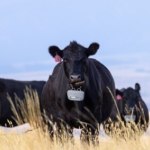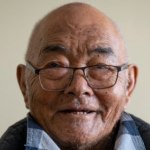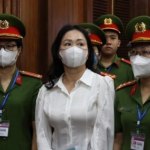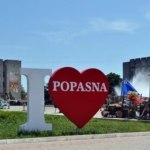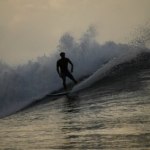07 March 2024
The Democratic Republic of Congo (D.R.C.) is looking to expand operations to dig, or drill, for oil. The central African country is known for its mineral riches. Currently, drilling is limited to just a small area along the Atlantic Ocean and out in the water. But that is expected to change if the government carries out its plan to sell 30 pieces of land for oil and gas exploration across the country.
Leaders say the plan will grow the economy. They say such growth is necessary for the poor people of Congo. But communities, rights groups, and environmentalist groups warn that expanded drilling will harm the environment and human health.
In the Moanda area of the D.R.C., locals say pollution has worsened since a French company began drilling there in 2000. They say spills and leaks from operations are destroying the soil. The work includes "flaring" --- the burning of natural gas near drilling sites. Locals report that the flaring is dirtying the air they breathe. Flaring is also wasteful as the energy goes unused.
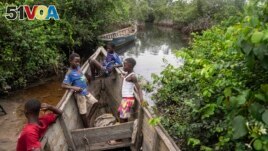
Children sit inside a fishing boat outside a mangrove in Kimpozia village, one of the areas auctioned for oil drilling, in Moanda, Democratic Republic of the Congo, Monday, Dec. 25, 2023. (AP Photo/Mosa'ab Elshamy)
And, critics say, the Congolese government does not supervise the oil drilling operations well enough.
The company, Perenco, says it follows accepted international measures in its extraction methods. It said its operation does not create health risks and that any pollution it causes is low-level. The company also said it offered to support a power plant that would make use of the natural gas and reduce flaring that way.
The government did not respond to questions about the proposed plant.
Congo's minister overseeing oil and gas, Didier Budimbu, said the government plans to protect the environment.
Natural areas in Congo, including the Congo Basin rainforest, capture large amounts of carbon dioxide – about 1.5 billion tons a year, or about 3 percent of what the world produces each year. More than 12 of the extraction areas for sale include land in government-protected wild areas.
The government said the 27 properties for sale hold an estimated 22 billion barrels of oil. Environmental groups say that selling more land to drill would have harmful effects in the D.R.C. and in other countries.
"Any new oil and gas project, anywhere in the world, is fueling the climate and nature crisis that we're in," said Mbong Akiy Fokwa Tsafak, program director for Greenpeace Africa. She said Perenco's operations have done nothing in respect to the poor and instead harm the environment and the lives of communities.
Environmentalists say Congo has a strong possibility to instead develop renewable energy.
Budimbu said now is not the time to move away from fossil fuels when the country still depends on them. He said the D.R.C. will move away from fossil fuel dependency over the long term.
Perenco has faced criticism for years. Local researchers, aid groups, and Congo's Senate have made multiple reports of pollution dating back more than ten years. Two organizations, Sherpa and Friends of the Earth France, opened a legal action against the company in 2022, accusing Perenco of polluting.
Adore Ngaka's lives in the village of Tshiende. Oil drills can be seen up the road from his home. Ngaka says they remind him every day of all that he has lost. The extraction processes have polluted the soil, hurt his crops, and forced the family to use all their savings to survive, he said.
He pointed to an ear of corn he grew. The 27-year-old farmer said the vegetable is about half the size of those that grew before the drilling began ten years ago.
He said, "It's bringing us to poverty."
I'm Caty Weaver.
Sam Mednick reported this story for The Associated Press. Gregory Stachel adapted it for VOA Learning English.
______
Words in This Story
drill – v. to try to get oil or water by digging through land or sea bed
extract – v. to remove or obtain a substance from something, for example by using an industrial or a chemical process
barrel – n. the contents of or the amount contained in a barrel; a unit of measurement in the oil industry equal to between 120 and 159 litres
fossil fuel – n. fuel such as coal or oil that was formed over millions of years from parts of dead animals or plants



